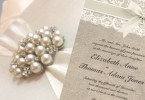The history of the wedding cake can be dated back as far as the Roman Empire where the groom would eat a part of a loaf of Barley and break the rest over the brides head. This was to symbolize the dominance the male had his bride and total, we the breaking of her virginFortunatelyFortunve come a long way since then.
Typically before the 17th century the wedding cake was sweetened bread, consisting of flour, sugar, nd water. By the nineteenth century the wedding cake became extremely popular and a focal point of the wedding. Early cakes were single tiered, plum or fruit cakes. Many traditions and superstitions came from the sharing of the wedding cake. One notable superstition was that sleeping with a piece of cake under ones pillow would make the dreamer, dream of their future spouse.
The tradition of the white wedding cake, symbolized purity and innocence and first appeared in the Victorian times. Wedding cakes were also white to symbolize affluence, status and wealth as the whiter the icing the more refined the sugar which was quite expensive. The wedding cake has always been linked with the bride and never more so that in today’s culture where the bride often matches her wedding cake icing to her gown or to the theme of the wedding. Today’s wedding cakes can take many colors other than white with wedding cakes becoming more and more a part of the wedding color theme.
Originally the wedding cake used to be single tiered which the bride and groom cut and distributed to their guests. With the size of weddings increasing and the need for larger multi-tiered cakes it is now the duty of the wedding reception venues or caterers to cut the cake and distribute it to the guests. In keeping with some of the older the traditions it is common for the bride and groom to distribute wedding cakes to the guests in either decorative bags or boxes. However it is also common for the wedding cake to be served as a part of the dessert or even as a part of a fourth course with after dinner cheeses and tea and coffee.
In some countries it is tradition for the bride and grooms to feed off the first piece of cake. In other countries it is customary for the bride and grooms to smash a piece of cake into the other persons face. This tradition is not dissimilar to the breaking of the loaf of bread over the head of the bride; however it does not have the same meaning.
Brides can also save the top tier of the cake to eat at their one year anniversary. This tradition originates in the 19th century as the newlyweds often saved the top tier of the cake for the christening of their first child which was usually 9 months after the wedding night. Now days the two traditions are disassociated as the more and more couples are having children later in the marriage.
The tradition of the wedding cake has its roots hundreds of years ago but is still common place in today’s weddings. It’s is still a central part of the wedding reception even though the meaning and superstitions associated with wedding cakes have changed. Wedding cakes are now more elaborate and decorative than ever before and truly make and elegant statement at the wedding reception.






